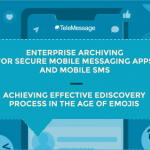Cloud computing is, without a doubt, the best solution for many businesses due to it’s affordability, scalability, robustness and efficiency. Companies use the cloud to store data, even communications data, through a third-party provider to allow access through the internet. However,due to the cloud’s accessibility, there are concerns about how properly secured the service can be.Many secure mobile messaging and enterprise instant messaging solutions platforms store data in the cloud, which prompts financial firms (who require enterprise instant messaging solutions) to ensure that their data is secured.
Both visibility and control of the data stored in the cloud are limited, which makes it challenging to secure the servers properly. Growing concerns in the use of cloud computing services already exist, as evidenced in the significant number of data breaches that dominate today’s headlines.
Cloud computing services present various security risks and challenges for the businesses that use them for many reasons, including employee negligence.
Responsibility Regarding Data Breaches
Salvatore Montemarano, a senior examiner at the Securities and Exchange Commission, noted that “Even if you have identified who has responsibility for what controls, you’re still outsourcing your services and your control of that data, and the firm is still going to be responsible.”
A firm that uses cloud servers to hold data and text messages is held responsible for any damages that can occur with cybersecurity breaches. The users who chose to rely on cloud providers are responsible for their data and mobile messages, and in case any data breaches occur, the cloud provider’s only responsibility is to inform the user of such an occurrence.
Financial firms that retain text messages data will be held responsible if any data breaches occur even when using enterprise instant messaging solutions for their communications.
To further eliminate any possible misunderstanding between the cloud user and the provider, both parties must clarify their respective roles regarding the data. Regulators scrutinize how the tasks on storage management and security between the users and providers are divided.
Cloud Providers’ Data Protection Measures For Secure Mobile Messaging and Enterprise Instant Messaging Solutions
Many cloud service providers see cloud security risks as a shared responsibility between them and the cloud service user. Several providers have already put security measures in place to reduce the chances of cybersecurity breaches from occurring.
Some cloud service providers assume control of several basic security provisions related to the data, including archived social messages, and cloudapps. The clients have limited access to the cloud security settings and receive notifications when attempts are made to alter them. Some providers even block their clients from making changes since the customers can inadvertently increase the system vulnerability.
Edward Screven, the chief corporate architect at Oracle, said that “We let customers know when they’re doing something unwise.” Cloud service providers see themselves accountable for the service itself while their customers are responsible for how they use the service. If any cybersecurity breaches occur, even if due to the inferior services of a provider, the company remains liable.
This, it is essential that the services of your cloud computing service provider offers the bestlevel of security obtainable between clients. The service provider’s other clients can pose a threat to a firm due to their shared cloud service resources, applications, and systems.
Additionally, a cybersecurity risk may arise from employee negligence since they tend to log into cloud solutions through potentially insecure devices, including mobile phones and personal computers.
Cloud solutions are also vulnerable to ransomware, phishing, and social engineering attacks, and it is the firm’s responsibility to ensure that its employees are knowledgeable about them to either remedy or avoid them. One way to minimize ransomware attack vulnerability is by having sufficient data backups to keep a company from being locked out of its own data.
The Firm’s Responsibility
Financial regulators are considering labeling big cloud providers as systematically important due to their increasingly critical role in the financial sector. Until such a designation is applied, financial firms must continue to select their cloud providers wisely. Companies continue to need enterprise instant messaging solutions that can effectively store communications data to ensure that they won’t face any security risks with the cloud.
The TeleMessage Mobile Archiver is a secure mobile messaging and enterprise instant messaging solutions that addresses compliance, regulatory, and eDiscovery response requirements. TeleMessage uses its own private cloud platform and stores data in SSAE-16 SOC2 certified hosting facilities. TeleMesage enables companies to better comply with regulations, including MiFID II, SEC, Dodd-Frank Act, HIPAA, SOX, GLPA, and those put into effect by the US Federal Courts.
TeleMessage captures and records mobile content, including SMS, MMS, voice calls, social media, and WhatsApp Chats from corporate or BYOD mobile phones. Messages are securely and reliably retained within TeleMessage servers or forwarded to an archiving data storage vendor of your choice. The secured data can then be used to remediate their compliance gaps.
Our mobile archiving products securely record content from mobile carriers and mobile devices for a variety of ownership models (BYOD, CYOD, and employer-issued). With our multiple archiving solutions, you can always find the right tools or blend for your requirements:
TeleMessage offers cross-carrier and international mobile text & calls archiving for corporate and BYOD phones. Contact us to learn more about our mobile archiving products


